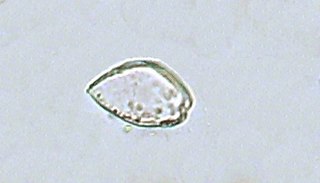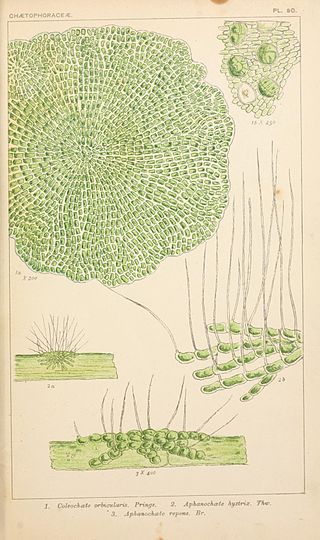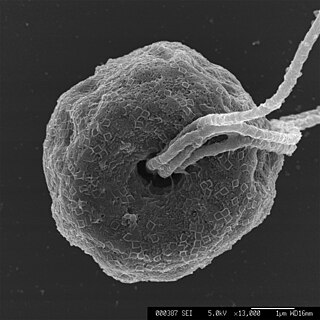
The Chlorophyceae are one of the classes of green algae, distinguished mainly on the basis of ultrastructural morphology. They are usually green due to the dominance of pigments chlorophyll a and chlorophyll b. The chloroplast may be discoid, plate-like, reticulate, cup-shaped, spiral- or ribbon-shaped in different species. Most of the members have one or more storage bodies called pyrenoids located in the chloroplast. Pyrenoids contain protein besides starch. Some green algae may store food in the form of oil droplets. They usually have a cell wall made up of an inner layer of cellulose and outer layer of pectose.

The Prorocentrales are a small order of dinoflagellates. They are distinguished by having their two flagella inserted apically, rather than ventrally as in other groups. One flagellum extends forward and the other circles its base, and there are no flagellar grooves. This arrangement is called desmokont, in contrast to the dinokont arrangement found in other groups. Accordingly, the Prorocentrales may be called desmoflagellates, and in some classifications were treated as a separate class Desmophyceae.

The glaucophytes, also known as glaucocystophytes or glaucocystids, are a small group of unicellular algae found in freshwater and moist terrestrial environments, less common today than they were during the Proterozoic. The stated number of species in the group varies from about 14 to 26. Together with the red algae (Rhodophyta) and the green algae plus land plants, they form the Archaeplastida.

AlgaeBase is a global species database of information on all groups of algae, both marine and freshwater, as well as sea-grass.

The Trebouxiophyceae are a class of green algae, in the division Chlorophyta. Their circumscription within the green algae is not well established due to the need for more genetic studies at higher levels within the group.
Oltmannsiellopsidales is an order of green algae in the class Ulvophyceae.
Dangemannia is a genus of green algae in the family Oltmannsiellopsidaceae.
Halochlorococcum is a genus of green algae, in the family Oltmannsiellopsidaceae.
Oltmannsiellopsis is a genus of marine colonial flagellate green algae in the Oltmannsiellopsidaceae family of Chlorophyta. It was named in reference to the similar genus Oltmannsiella. It has three species, O. viridis, which forms four-celled colonies, O. unicellularis, which is single celled, and O. geminata, which forms two-celled colonies. In Japanese it is called ウミイカダモ.

Chlorokybus is a multicellular (sarcinoid) genus of basal green algae or charophyte. It has been classified as the sole member of the family Chlorokybaceae, which is the sole member of the order Chlorokybales, in turn the sole member of the class Chlorokybophyceae. It grows on soil and rock surfaces, and is rare.
Mesostigma is a genus of unicellular biflagellate freshwater green algae, with a single species Mesostigma viride, covered by an outer layer of basket‐like scales instead of a cell wall. It is the only known genus in the class Mesostigmatophyceae.

Coleochaetophyceae is a class of charophyte algae related to land plants. There are about 35 known species, and are predominantly found in freshwater where they live periphytic on the surface of aquatic plants, plastic bags and pebbles in the shallow littoral zone of freshwater lakes. These are small disc-shaped or filamentous species, and have true multicellular organisation with sexual and asexual reproduction. The discs never develop beyond a two-dimensional organization. Their mitogenome is the most intron rich organelle among the streptophyte algae.

Pyramimonadophyceae is a class of green algae in the division Chlorophyta.







